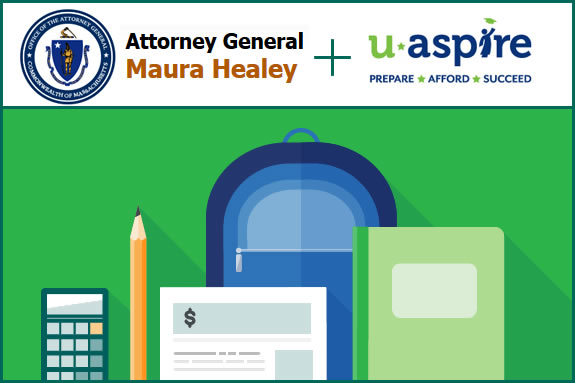
As colleges and universities begin sending financial aid award letters to prospective students throughout Massachusetts, Attorney General Maura Healey has launched a campaign to help educate families about their higher education options and understand how to pay for them.
Last year, the AG’s Office and the Greater Boston Chamber of Commerce created a Student Debt Working Group to develop concrete proposals to help Massachusetts students pursue quality, affordable higher education. This new initiative is the result of a partnership between the AG’s Office and uAspire – a Working Group member and nonprofit organization that provides students with counseling and tools to find an affordable path to and through college.
“This is an exciting time of year for students and families who are making important decisions about going to college, but financial aid award letters can be hard to digest,” AG Healey said. “Through our office’s work to address fraud and abuse in student lending, we have seen the impact that student debt is having in Massachusetts and across the country. This initiative is about better understanding financial aid packages offered by colleges and making an informed decision about where to enroll and what it will cost. We are pleased to partner with uAspire to make sure that all of our students can pursue quality, affordable education.”
AG Healey’s campaign – located at mass.gov/ago/studentawardletter – includes helpful graphics, sample forms, tips, and resources online to help students and families understand and compare financial aid award letters and determine the amount of money they’ll need to pay for college. While acceptance letters are typically straightforward, the financial aid award letters can be confusing, hard to compare, and vary greatly from school to school. Too often, the AG’s Office hears that students did not realize how much they would owe until after finishing school.
“uAspire is grateful for the opportunity to partner with the Attorney General’s Office and the Boston Chamber of Commerce to give Massachusetts families the resources and information they need to effectively analyze award letters, a critical step in making a sound financial decision when choosing a college,” said Gabrielle King Morse, Executive Director of uAspire Massachusetts.
“We are so proud to have partnered with the Attorney General's Office on the Student Debt Working Group, and we are pleased that, in short time, this partnership has produced a wonderful resource to help students and their families make informed decisions about their higher education and financial aid options,” said James E. Rooney, president & CEO of the Greater Boston Chamber of Commerce. “Maintaining our state's reputation for the most talented workforce in the world, and improving access to education at all levels, for all Massachusetts residents are top policy priorities for the Greater Boston Chamber and our members. We are thankful to the Attorney General for her commitment to addressing these critical business issues, and look forward to more collaborative and productive work in the coming months.”
“A point of pride for Massachusetts is that it is home to so many high quality colleges and universities,” said Rob McCarron, Senior Vice President and General Counsel of Association of Independent Colleges and Universities in Massachusetts (AICUM). “Choosing the right college is a major life decision, but also one that brings career and life advantages. Our institutions expect and want students to ask questions, especially when it comes to financial aid opportunities. The financial aid process exists to help students and their families, and college admissions teams are always ready to explore a variety of options in order to create a class that brings diverse talents and interests to their campuses. AICUM is proud to support the Attorney General in ensuring that the financial aid process remains transparent and robust.”
“This is a critically important issue for families, especially for students who will be the first in their families to attend college or those for whom English is a second language,” said Carlos E. Santiago, Massachusetts Commissioner of Higher Education. “While many campuses have made progress in demystifying the language used to describe aid awards, we need to work even harder to ensure that all students understand the financial benefits and implications of their packages. I applaud the Attorney General’s efforts and pledge to work closely with her office to improve the quality and clarity of communications with families.”
Addressing fraud and abuse in student lending has been a top priority for AG Healey since taking office, whether taking predatory for-profit schools to court, and changing the practices of student loan servicers, to going after unlawful student debt relief companies, updating the U.S. Department of Education’s federal loan discharge regulations and helping thousands of struggling Massachusetts student borrowers secure relief and get out of debt.
The AG’s first-in-the-nation Student Loan Assistance Unit has helped student borrowers understand their repayment options, resolve defaulted loans, apply for discharges, and mediate billing disputes with loan servicers. Each year, the Unit receives hundreds of calls from students and parents who are struggling with student loan debt. Borrowers with student loan problems are encouraged to file a Student Loan Request for Assistance to get help. Students and parents with questions or concerns about financial aid award letters should call the Student Loan Assistance Unit’s hotline at 1-888-830-6277 or fill out an Award Letter Help Request.
Students and families can also get individual help by bringing award letters to a seminar hosted by MEFA. They may also call or visit an American Student Assistance College Planning Center in Boston or Brockton where counselors are available to help, or go to American Student Assistance’s website for helpful resources. Students are also advised to use CollegeScorecard.ed.gov to learn more about each school, including the costs of attendance, graduation rates, and the average earnings of graduates.













